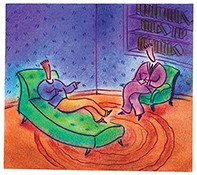Peer Reviewed
Feature Article Psychiatry and psychology
On the (examination) couch: psychotherapy for depression in general practice
Abstract
Psychotherapeutic treatments can be matched to individual patient requirements and delivered effectively in general practice.
Key Points
- Patients prefer psychotherapy. It should be considered as a first line treatment in uncomplicated mild or moderate nonmelancholic depression.
- Supportive counselling, cognitive behavioural therapy (especially problem solving) and interpersonal psychotherapy have been shown to be effective in primary care settings.
- Short forms of interpersonal psychotherapy and cognitive behavioural therapy (four to six 30 minute sessions) have been developed for general practice.
- Add a first line antidepressant if no benefit after four to six sessions.
- Substance abuse, a personality disorder or acute intercurrent stressor should be excluded in patients who do not respond to psychotherapy.
- Specialist review is indicated for patients with suicidal ideation, mania or psychosis, and for patients with progressive or treatment-resistant depression.
Purchase the PDF version of this article
Already a subscriber? Login here.

